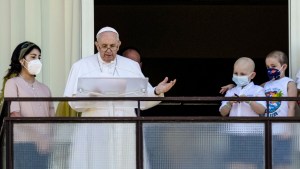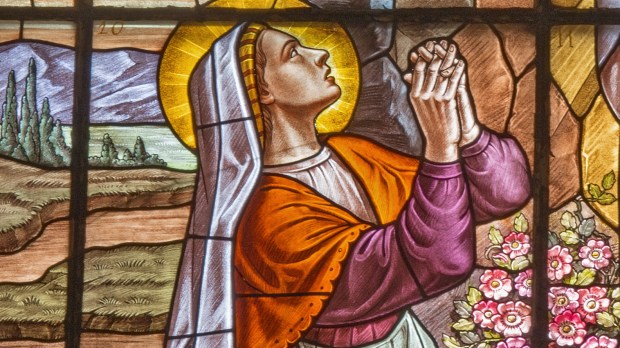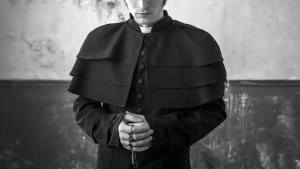Though there are countless saints whom the world would consider geniuses, there is no intellectual prerequisite to canonization. Those with intellectual disabilities are called to holiness just as much as every other person created in the image and likeness of God, created to give and receive love. Saints who might today be considered intellectually disabled (or whose learning disabilities were such that they were ridiculed and pushed aside) can stand as witnesses to those with similar experiences and can remind all of us that our value lies not in what we can do, accomplish, or achieve but in the Father’s love for us.
St. Joseph of Cupertino (1603-1663) was an Italian man who was ridiculed for his intellectual and social difficulties. Called “the Gaper” because he spent most of his childhood staring blankly with his mouth open, Joseph was barely literate and frequently erupted in anger. He often trailed off in the middle of a sentence and returned to staring off into space, either from religious ecstasy or as a result of some neurodivergence; many scholars today believe that he may have been autistic. Joseph’s differences were the object of ridicule on the part of his neighbors and even the friars in the Franciscan community he joined. Because of his great holiness, Joseph was asked to study for the priesthood, though there was no doubt he was intellectually unqualified; but (miraculously!) Joseph passed the necessary examination and was ordained. Throughout his priesthood, he was known not only for his obvious intellectual disability but also for his mystical experiences, including frequent levitation, all of which led to bullying and abuse from his brothers in religion. But while many treated him harshly, many were edified by Fr. Joseph’s sudden moments of piety (when he would kneel down in the midst of washing dishes and begin to meditate, for example) and moved by his implacable friendliness and lightheartedness and his absolute humility.
St. Agatha Kim A-gi (1787-1839) was a Korean woman who longed to be baptized. Her intellectual disability, however, made it impossible for her to learn the faith; even the Hail Mary was too much for her. When asked to recite various prayers, Agatha would say, “I only know Jesus and Mary.” No matter how hard she tried, she couldn’t memorize anything and was denied baptism (at a time when the Catholic Church in Korea had been without any priests for a generation, and the faithful were unaware that theological acuity is not a prerequisite for adult baptism). But when arrested and ordered to denounce the faith under torture, Agatha’s response was the same: “I only know Jesus and Mary.” She was baptized in prison shortly before her martyrdom.
St. Bernadette Soubirous (1844-1879) had such a difficult time learning that at age 14 she was still unable to count and hadn’t yet made her First Communion because she was unable to answer the necessary catechism questions. But it was exactly this difficulty that won the confidence of Bernadette’s priest when she revealed that Our Lady had appeared to her. Bernadette was unable to read and spoke a local dialect, with no knowledge of French at all. So when she declared that the Lady was “the Immaculate Conception,” her priest was convinced that Bernadette couldn’t have invented the story — she simply wasn’t capable of it. After the apparitions at Lourdes were over, Bernadette entered a convent, where her intellectual difficulties continued to complicate her life. At one point, her mother superior despaired of finding a job for the young sister, saying, “She is a little stupid, and is good for nothing.” Bernadette was tasked with praying, which she could do quite well even without much education, and she spent the rest of her life pleasing God in the convent, whatever the other Sisters might have thought.
St. Zhang Huailu (1843-1900) was born to a non-Christian family in China but learned about the Gospel and longed to know more. Though his family opposed him, he enrolled in catechism classes when he was nearly 60. There, he discovered that he was entirely unable to learn any of the prayers that the children learning alongside him absorbed so readily. Though he was ashamed of his difficulties, Huailu persevered. “No matter what happens, I do love God with my whole heart,” he said. “God saves my soul. It doesn’t matter that I cannot read.” During the Boxer Rebellion, the catechumens fled, seeking safety outside the village where their faith was well known. But by this point, Huailu was infirm and was caught by criminals working with the rebels. Pitying him, they told the Boxers that he wasn’t truly a Christian, as he couldn’t say any Christian prayers. Though he might have remained quiet and accepted this reprieve, Huailu refused to present himself as a non-Christian. He insisted that he was a follower of Jesus and was summarily executed.
St. Maria Bertilla Boscardin (1888-1922) was ridiculed for her intellectual difficulties by family, classmates, and even her pastor. She was only accepted to religious life with great reservations and was made to do the most menial tasks until her religious superiors accidentally discovered that the barely tolerated, illiterate Sister was a brilliant nurse. Children who were wild with fear calmed almost instantly before her. She was courageous as well as being kind and talented; when air raids threatened the hospital in World War I, Sr. Bertilla insisted on staying with the patients who could not be moved. At one point, a jealous superior moved her to the laundry. Within four months, Sr. Bertilla had been returned to the hospital and made ward supervisor. She served as a nurse (in spite of the judgment and jealousy of others) until she died of cancer at 34.



